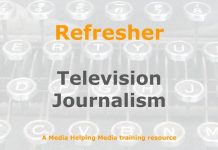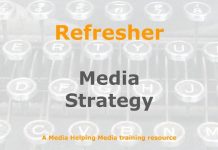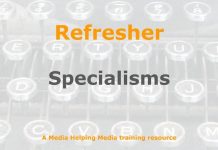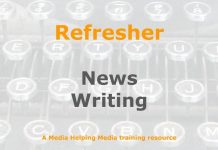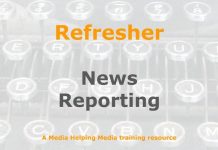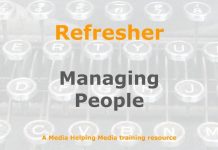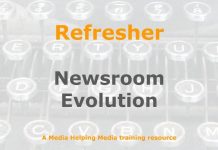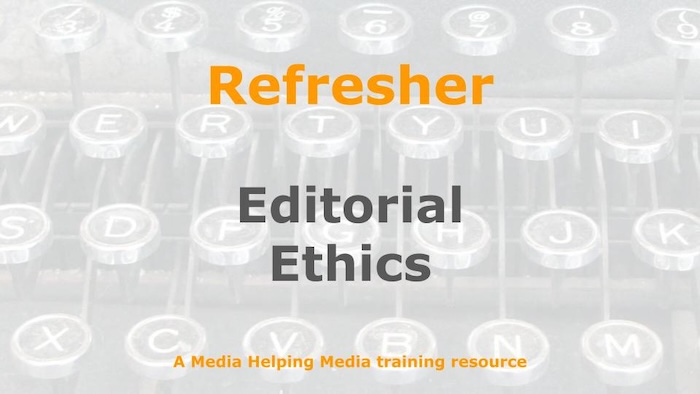 This intensive day course offers a crucial refresher on the core principles of editorial ethics, which are vital for maintaining public trust in contemporary journalism.
This intensive day course offers a crucial refresher on the core principles of editorial ethics, which are vital for maintaining public trust in contemporary journalism.
We will explore key moral frameworks, confront modern ethical challenges, and apply critical thinking to complex real-world scenarios. This refresher is based on the six-week module on editorial ethics which you are free to download, adapt, and use.
We recommend that trainers circulate the recommended reading resources listed below and encourage participants to read them before attending this refresher.
Learning objectives
Upon completion of this course, participants will be able to:
- Understand and apply core principles of journalistic ethics, including accuracy, fairness, and integrity.
- Recognise and mitigate the impact of unconscious bias in reporting and news production.
- Evaluate and resolve ethical dilemmas concerning privacy, offence, and social responsibility.
- Develop strategies for managing real and perceived conflicts of interest.
- Improve critical thinking and ethical decision-making skills in various journalistic contexts.
Programme schedule
This schedule is structured as four 90-minute core sessions, each comprising a lecture/discussion, a practical activity, and dedicated pre- or post-session reading.
Session 1: The bedrock of trust (9:00 – 10:30)
- Topics covered: What are editorial ethics and why are they crucial? The role of ethics in maintaining public trust. Accuracy and integrity as non-negotiable standards, including fact-checking and avoiding fabrication. Identifying and managing conflicts of interest.
- Activity: Analysing and comparing conflict of interest policies from different major news organisations.
- Recommended reading:
(10:30 – 10:45) Break
Session 2: Engaging the public with fairness (10:45 – 12:15)
- Topics covered: The principles of fairness and impartiality, ensuring all parties receive a fair hearing and distinguishing clearly between opinion and fact. The ethical tightrope of respecting privacy, balancing the public’s right to know against individual rights, and the legal implications of privacy violations.
- Activity: Scenario-based group debate: Justifying an invasion of privacy based on public interest criteria.
- Recommended reading:
(12:15 – 1:15) Lunch
Session 3: Nuance, sensitivity, and social responsibility (1:15 – 2:45)
- Topics covered: Addressing the ethical considerations of causing offence; balancing freedom of expression with social and cultural responsibility. Identifying, understanding, and implementing strategies for mitigating unconscious bias in story selection, sourcing, and language.
- Activity: Practical exercise: Rewriting a potentially biased or offensive article to be more inclusive and editorially justified.
- Recommended reading:
(2:45 – 3:00) Break
Session 4: Ethical application and conclusion (3:00 – 4:30)
- Topics covered: Applying established ethical frameworks to real-world case studies and complex dilemmas. Practical steps for ongoing ethical self-assessment. Review of key principles and open discussion on the evolving ethical landscape of digital media.
- Activity: The ‘ethical test’: Applying the core questions of journalistic purpose, consequence, and justification to a final complex scenario.
- Recommended reading:
Concluding summary and discussion (4.30 – 5)
This course offers a comprehensive and actionable framework for making sound ethical decisions in a constantly changing media environment. The principles of accuracy, fairness, independence, and accountability remain the foundation of trustworthy reporting. By examining case studies and applying learned frameworks, participants are equipped to uphold the highest standards of professional conduct and safeguard the integrity of the journalistic process.
Related material
Module: Editorial ethics for journalists
Lesson: The importance of editorial ethics
Why editorial ethics are important
